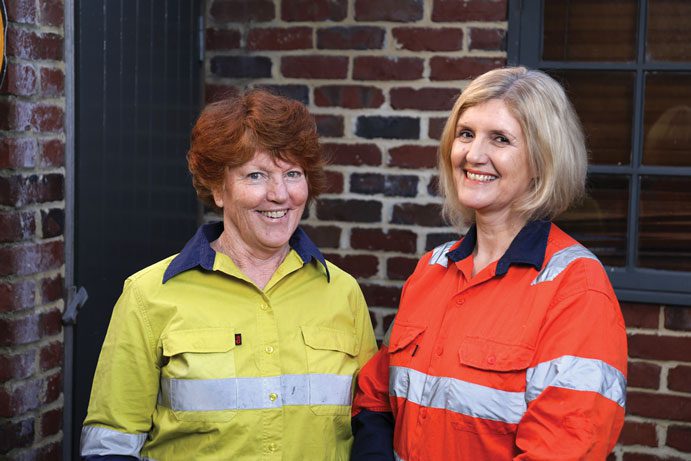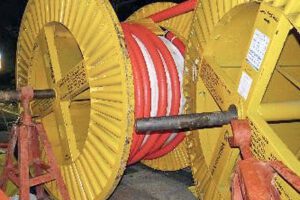This FIFO Life is a publicly-sponsored website aimed squarely at providing tools, resources and support to FIFO workers and their families. In this edition of Australasian Mine Safety Journal we talk to Sue Crock from This FIFO Life about some of the mental health challenges that confront workers engaged in this
non-traditional lifestyle.
Do you believe the FIFO lifestyle is detrimental to the mental health of workers?
Recently there has been a great deal of media attention on the issue of FIFO suicides and the influence of the work pattern on workers’ mental health. There is no doubt that FIFO work can be lonely, tiring and stressful. However, there are many FIFO workers who love the lifestyle and whose mental health is supported by the work.
Mental health is influenced by many factors: feeling good about ourselves, having healthy relationships with others, being able to deal with the normal stresses of life, doing productive work and making a contribution to your community in some way. In any workplace, if workers feel they are productive and their work is valued, they have good relationships with their workmates and they feel safe at work, it will support their mental health and wellbeing.
Having a job is a great benefit to our mental health. We work to support ourselves and our families but we also work to meet people and to make a contribution. So workplaces play a very important role in mental health.
There are some aspects of FIFO that place workers’ mental health at serious risk that need to be understood and addressed. The Parliamentary Inquiry into the impact on mental health of FIFO work arrangements recently held in Western Australia will, I hope, highlight these and make considered recommendations to address them.
In your opinion, is there more mine companies could be doing to address the mental health concerns of FIFO workers in their employ?
Mining companies generally have high standards of physical safety in order to ensure workers’ safety and maintain productivity. They know it is good business practice.
However, the impact of mental health is not well understood within the resources sector. It is as equally important as physical health, not only to workers but also to a company’s risk management and productivity.
Creating a mentally healthy workplace is good business practice and a good investment. Price Waterhouse Coopers released a Return on Investment Analysis, Creating Mentally Healthy Workplaces in March 2014 and demonstrated that, for every $1 business invests in mental health, there is a $2.30 return. In the mining sector this return rises to as much as $5.70.1
Mining companies can make a significant contribution to workers’ mental health by addressing workplace bullying and harassment, by offering family friendly rosters, and by having leaders and managers who support improving the culture and mental health in their workplaces.
Mining companies that work with their employees to develop a Mental Health Plan and put in place strategies to support the plan will be investing in improving retention, reducing workers compensation claims, improving morale and employee engagement and addressing absenteeism and ‘presenteeism’ (where a person is at work but not productive when preoccupied with other issues). They will also be establishing the company’s reputation as an employer of choice and meeting legal and ethical health and safety obligations.
There have been calls to “demilitarise” FIFO camps and provide more space, time and scope for recreational activities, with the aim of reducing stress. Do you think this idea has merit?
Mine sites and camps have strict safety standards and work practices enforced to minimise the risk to workers and to maintain production levels. Some see this as militarised and rigid, others as necessary to the smooth running of sites.
However, it does have an unintended consequence. When workers do not have to make decisions for themselves or be responsible for taking care of their day to day needs they can become dependent on external rules rather than being self-regulating and self-disciplined. This does not encourage self- reliance and resilience which are important factors in staying mentally healthy.
Some FIFO partners have described how this makes parenting difficult, when FIFO workers expect their children to simply ‘follow the rules’ and do as they’re told when they are at home. It can create conflict and a clash of parents’ expectations, adding stress to the relationships within the family.
Camps and villages are a great place to build workers’ sense of connection and belonging and for workers to unwind and de-stress. Both are an important part of positive mental health. In many camps the options for recreation are limited. Opportunities for workers to share activities together, exercise in ways they enjoy and have options other than the wet mess to relax will help workers’ stay mentally healthy.
In your opinion, could a change to rosters improve the mental health outcomes for FIFO workers?
Family friendly rosters are highly valued by workers and for a good reason. They know that these rosters make FIFO work less stressful, allow them more time with their families and friends and supports their mental wellbeing.
Long rosters (eg.four weeks on and one week off or even longer) place a great deal of stress on workers, especially with managing fatigue. These rosters are not family friendly, making it much more challenging for workers to maintain close relationships with family and friends. For workers who are part of a work team that is close and supportive, the stress of long rosters may be more manageable. However, over time they are unsustainable and create risks for both workers and employers.
There have been many reports, and anecdotal evidence, to suggest that many FIFO workers refuse to seek help for mental health issues, even when it’s freely on offer. Why do you think this is so?
There are many reasons including disliking asking for help, refusing to admit we have a problem, worrying about being labeled or diagnosed with an illness, fearing losing our job and the misunderstanding and stigma around mental illness.
None of us like admitting we have a problem. Most of us try and sort it out ourselves and only seek help when it is clear we can’t or when the problem gets so serious we have little choice. Even then, some of us refuse to get help. Instead we may drink heavily, take drugs to excess, lose relationships or even take our own life rather than get help. Getting help may challenge our idea of ourselves as independent and strong. FIFO workers are no different to any other workers in this respect. The truth is that it takes strength to ask for help, it is not a weakness.
There is still a great deal of fear and misunderstanding about mental illness. Many people will not seek help early when they are faced with problems out of fear or being diagnosed as ‘ill’. The fact is that the sooner we seek help, the more likely it is that the problem can be addressed. It doesn’t matter if these are relationship problems, parenting difficulties or anxiety, depression and other mental health problems. Mental illness is treatable and most people recover fully when they get help.
The World Health Organisation has highlighted the incidence of mental illness:
30% of the adult population suffers with a recognised mental health issue in any one year.
Depression is the fourth biggest health issue in the world and by 2020 it will be the second.
One in five people will suffer with depression at some stage in their lifetime.
One in four adults will experience drug or alcohol addiction.
One in two adults will seriously consider taking their life.
One in ten will attempt to end their life.
So mental illness is not something that happens to ‘other people’. It will impact on all of us in some way. That’s why we need to talk about it, understand that it is treatable and learn how to look after our mental health.
One of the best ways in which we can learn about mental illness is to hear the stories of people who are willing to talk about their experiences. When leaders speak about their challenges with depression or anxiety and other illnesses, it helps break down the stigma and makes it easier for others to seek help.
Many FIFO workers fear losing their job if they seek help for mental health issues or tell their supervisors about them. Many have said they have witnessed workmates being sent off site and not returning when they have mental health problems. Supervisors and workmates’ negative comments also discourage workers speaking about or seeking help for their problems.
What are some of the ways FIFO workers can reduce stress and anxiety while on shift?
Most FIFO workers know how to reduce stress and anxiety and all have their own ways of doing this. However, some ways are more effective than others. For example, exercise is a great way to unwind, ensure a good night’s sleep and stay well. Using alcohol and drugs may help in the short term but can create other problems if they are over used. Taking good care of our physical health by eating healthy food, exercising regularly and getting enough sleep are essential to reduce stress. Staying in touch with a partner, children and other family and friends also helps reduce stress. If you are not sleeping well or concerned about your wellbeing, get it checked out. Visit your GP for a check-up or, if you’re on site and worried, talk to the EMO, your supervisor or phone someone you trust.
Sometimes workers can worry about problems at home that can be stressful, especially when they are not there to help sort them out. It’s important to talk to someone about it. Talk to a mate, a supervisor or someone you trust. If necessary, ask for some time to sort out the problem rather than ignoring it or constantly worrying about it. There is nothing wrong with having problems. Everyone faces them sometimes. How we respond to them will either add or reduce our stress. Talking about our problems is often a simple way to reduce our stress.
If you notice one of your workmates is withdrawn, looking worried or not his or her usual self, ask if he is OK. Looking out for each other is one of the best things we can do for mental health in the workplace.
Why was This FIFO Life created? What was the inspiration or catalyst behind the website?
This FIFO Life was developed to support the mental health of FIFO workers and their families, those who work in the resources sector or live in regional and remote parts of WA.
The WA Mental Health Commission recognised that most FIFO workers are men working in isolated areas away from family and friends, placing them at increased risk of suicide. In Australia suicide is the leading cause of death for men aged under 44 years.
This FIFO Life is also for women working in the mining sector.
What kind of information or services are available on the website for workers who are struggling to cope with the FIFO lifestyle?
The website has blogs, which are short articles with information, tips, links and videos about a wide range of topics that support mental health. Some examples include managing stress, building resilience, getting help with gambling, managing financial problems and many more.
On the website there is a directory of support services and help lines. A shorter printed version of this directory is also available, called ‘Take 5 for mental health’. Companies have purchased this booklet to provide to their workers at induction, in dongas and for them to take home to their families.
The team that developed This FIFO Life has experience of FIFO and work in mental health. Their many conversations and interviews with FIFO workers and families have shaped This FIFO Life. There are some great guest bloggers and This FIFO Life welcomes contributions. Find us on LinkedIn, Facebook, Twitter, Instagram and Youtube; or visit our website at www.thisfifolife.com.














Add Comment